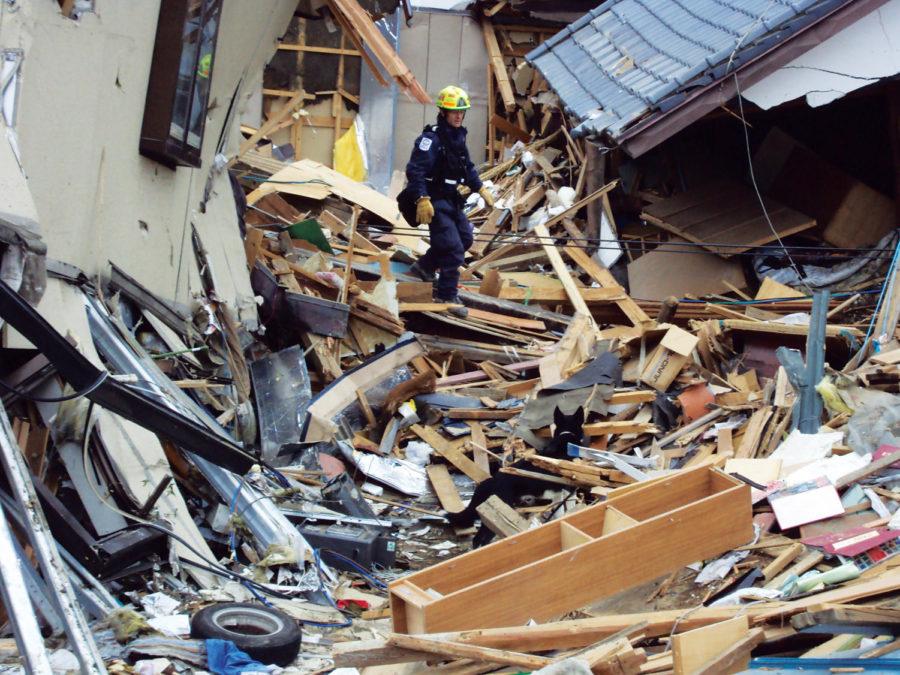Vriezen: Japan disaster puts our lives in context
Photo: Douglas Schantz/CNN Wire Service
Workers search through the rubble left by the tsunami March 14 in Ofunato, Japan. The 9.0 magnitude earthquake and subsequent tsunami left thousands of Japanese dead or missing, and has left the Japanese people with nuclear problems.
March 20, 2011
Since Japan was hit by the world’s fourth strongest earthquake in more than a century March 11, the headlines have been filled with news of destruction, devastation and death. The 9.0 magnitude earthquake has been followed by tsunamis, aftershock and a climbing body count.
The official death toll was reported to be more than 8,000 on Sunday, with more than 12,000 reported missing. This doesn’t even begin to factor in the millions displaced, injured or those unfortunate enough to reside near the nuclear reactors.
Looking through the headlines after a major disaster such as this seems to put our lives in blunt perspective. When skimming through the headlines listed at DrudgeReport.com, all but a handful of stories are on some aspect of the crisis in Japan. Other headlines listed, such as “‘Stalker’ seized in Madonna’s mansion,” seem shallow and irrelevant in comparison. The recent unrest in Wisconsin is quickly forgotten. Even turmoil in Egypt has taken a backseat as the world watches Japan fight its way through the aftermath of the quake.
Safe in the Midwest, we have little to fear from extreme natural disasters like massive earthquakes or tsunamis. We just have to hope that the Yellowstone caldera doesn’t erupt anytime soon, but otherwise, our worries are limited to mostly floods and tornadoes.
While our own natural disasters are life-altering, and deaths sometimes occur, few of us can begin to comprehend the tragedy that has struck Japan and the Pacific Islands.
Is it because of where we live that we might find the situation hard to take in? This is quite likely. The closest thing I can recall to a Midwest disaster is the Minnesota I-35 bridge collapse in 2007. Though not a natural disaster, 13 people died in the collapse, and for us, it was tragic.
Japan, on the other hand, sits right on the borders of three tectonic plates. This makes the country susceptible to frequent earthquakes, the consequences of which are usually tsunamis.
There is quite a history of deadly quakes and waves that have taken many lives. To provide a bit of context, in the recent disaster, it would be as if more than half of the ISU campus was gone; either dead or missing, half of us would vanish.
I don’t think we can truly understand the comparison. Yes, we may be able to sympathize with those in Japan, but how many of us can empathize with them? Is it because most of us are unable to empathize that we can easily read news story after news story without so much as a tear shed for those in Japan?
I know I was able to. I have never had to face the destruction of my home, my city, the death of all my family and friends. It is unimaginable to me. In my bubble of security, I can look at Japan’s headlines and feel sadness for the crisis, but ultimately, I will return to my life and continue living.
Joseph Stalin once said, “A single death is a tragedy, a million deaths is a statistic.” To us, our sparse fatalities are tragedies. We can name each person that died and tie them into a community and to a life.
However, when the numbers become great, deaths cease to hold personal meaning to the public. We cannot write about each and every story behind a face. Perhaps we don’t even know who all the faces are. The faces become a number.
It is probably a combination of this fact and our own lack of familiarity with true disaster that allows us to read over the headlines and then put them out of sight and mind as we click on an article about the next interesting thing.
It is not that we are uncaring or cold-hearted toward those suffering in Japan, it is that we simply cannot find a way to take the situation and put it in the context of our own lives. There is no comparison that we can make to understand Japan’s troubles.
Most of us will probably never have a scenario in our lives that will enable us to understand disasters of this magnitude. We should be thankful that we can’t. We remain safe in the central United States. Our worries consist of union rights and education funding. We need not be preoccupied with radiation exposure or total destruction of our cities.
But the next time we start to bemoan the state of our lives, let’s put it in perspective.
Whenever I start to have a pity party regarding the state of my life, I play the song “Keep’n It Real” by Shaggy. The lyrics I focus on remind me “no matter how you’re sad and blue, there’s always someone who has it worse than you.” My day might have sucked, that test might have gone badly, but when I think about how well off I am compared to some, there is nothing I can complain about.
Yes, we may be facing budget cuts at Iowa State and there continue to be tuition increases, but if this is all we can complain about, life isn’t all that bad.







